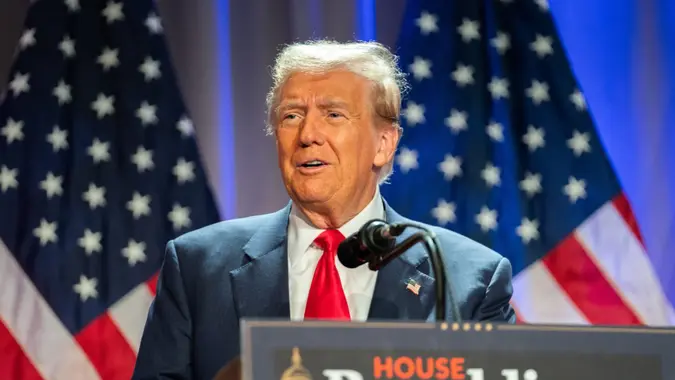Trump Just Announced ‘Liberation Day’ Tariffs — What This Could Mean for the Economy and Your Wallet

Commitment to Our Readers
GOBankingRates' editorial team is committed to bringing you unbiased reviews and information. We use data-driven methodologies to evaluate financial products and services - our reviews and ratings are not influenced by advertisers. You can read more about our editorial guidelines and our products and services review methodology.

20 Years
Helping You Live Richer

Reviewed
by Experts

Trusted by
Millions of Readers
Many consumers are wondering what’s ahead in the months and year to come now that President Donald Trump has unveiled expansive new tariffs. Trump announced the news on Wednesday in what he called a move to tackle unfair trade practices.
While supporters said the tariffs will ultimately help America, critics called this a risky bet that could send prices much higher and weaken the growth of the economy, according to CNN.
GOBankingRates talked to some financial experts for their ideas about what the tariffs could mean for the economy and your money.
Higher Prices for Consumers
“Tariffs often mean higher costs for imported goods, which can trickle down to consumers,” said Christopher Stroup, founder and president at Silicon Beach Financial. “If ‘Liberation Day’ tariffs take effect, expect price increases on everything from electronics to household essentials.”
Andrew Lokenauth, owner of Be Fluent in Finance, said his calculations and research from top economists suggest the average American household could see about $1,000 to $2,000 in additional annual costs.
Potential Inflationary Pressure
According to Stroup, new tariffs could drive inflation by making imported goods more expensive, pushing up prices across the economy. If inflation rises, the Federal Reserve might delay interest rate cuts, affecting borrowing costs for businesses and individuals.
Lokenauth said electronics could see big increases. For example, an iPhone could cost $300 more due to the new China tariffs. He added that companies won’t just eat the costs, they’ll pass them along to consumers.
Opportunities for Strategic Planning
While tariffs present challenges, they also create opportunities, according to Stroup.
“U.S.-based manufacturers and service providers might benefit from reduced competition,” Stroup said. “Entrepreneurs should analyze how shifts in trade policy could impact their industry and adjust their growth strategy accordingly.”
“What keeps me up at night is the recession risk,” Lokenauth added. “The data I’m reviewing suggests these tariffs could significantly reshape the U.S. economy over the next few years — and not necessarily in a good way.”
Editor’s note on political coverage: GOBankingRates is nonpartisan and strives to cover all aspects of the economy objectively and present balanced reports on politically focused finance stories. You can find more coverage of this topic on GOBankingRates.com.
 Written by
Written by  Edited by
Edited by 

























